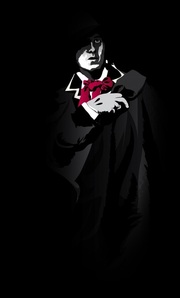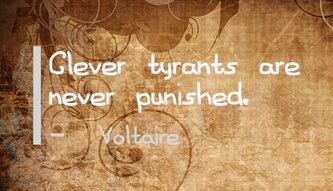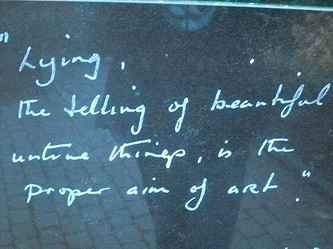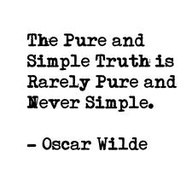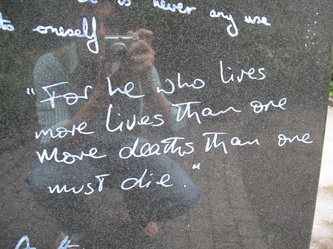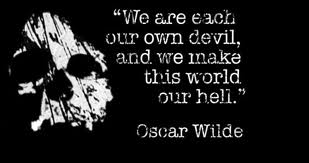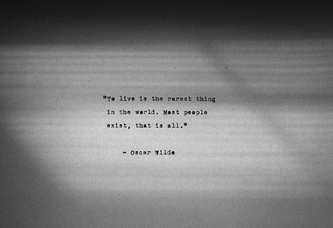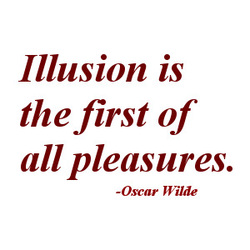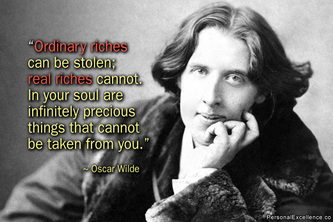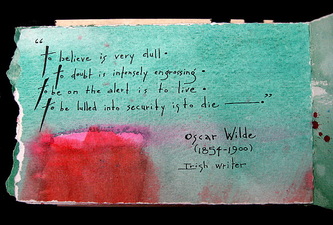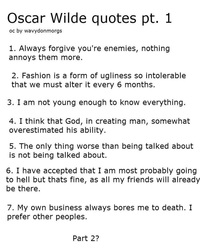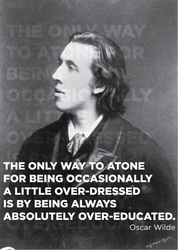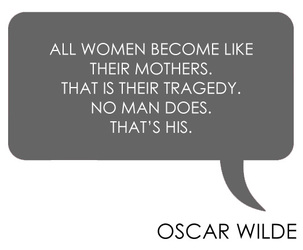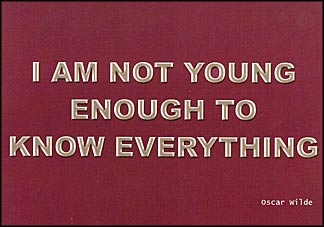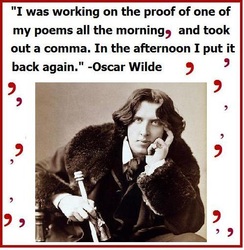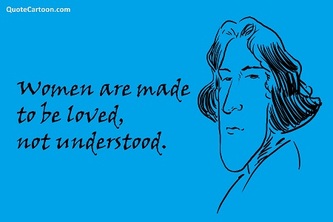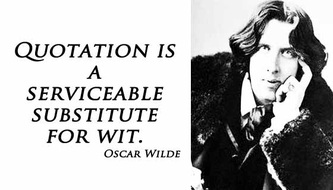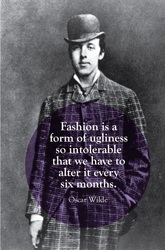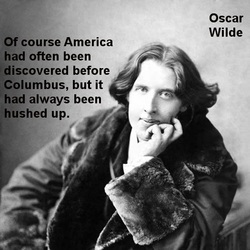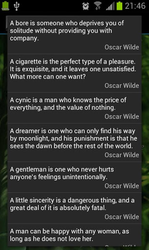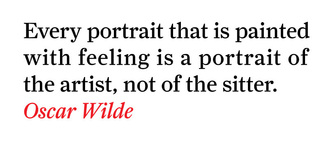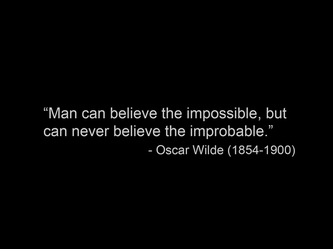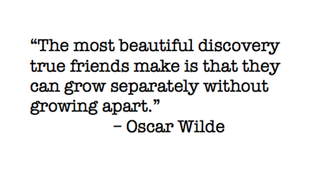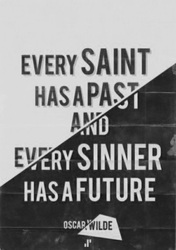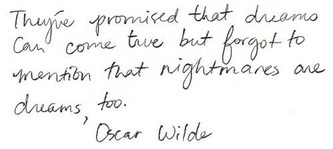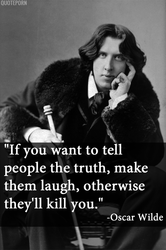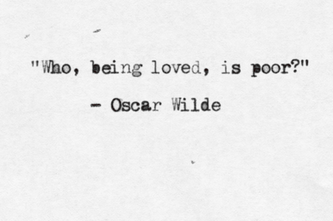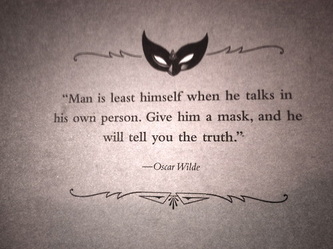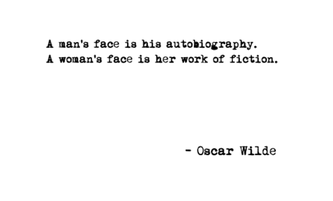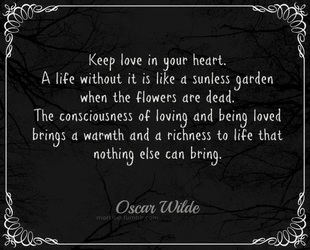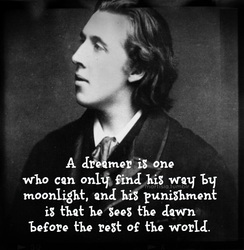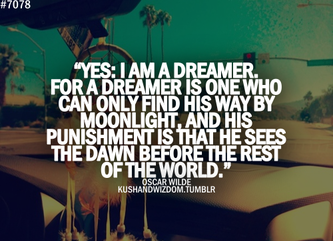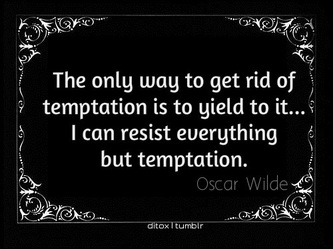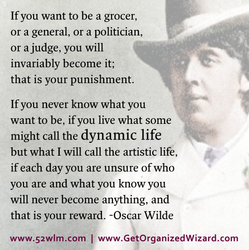"All trials are trials for one's life, just as all sentences are sentences of death; and three times have I been tried.
|
Oscar Wilde (1854-1900)
http://www.cmgww.com/historic/wilde/
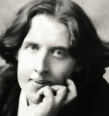
...was a controversial Irish dramatist, poet, and author wrote the darkly sardonic Faustian-themed, The Picture of Dorian Gray (1891).
"In the centre of the room, clamped to an upright easel, stood the full-length portrait of a young man of extraordinary personal beauty, and in front of it, some little distance away, was sitting the artist himself, Basil Hallward, .... "I hate them for it," cried Hallward. "An artist should create beautiful things, but should put nothing of his own life into them. We live in an age when men treat art as if it were meant to be a form of autobiography. We have lost the abstract sense of beauty. Some day I will show the world what it is; and for that reason the world shall never see my portrait of Dorian Gray."
Ever the aesthete, Wilde himself was profoundly affected by beauty and lived and dressed flamboyantly compared to the typical Victorian styles and mores of the time. He was often publicly caricatured and the target of much moral outrage in Europe and America. His writings such as Dorian Gray with homoerotic themes also brought much controversy for him but he was part of the ever-growing movement of 'decadents' who advocated pacifism, social reform, and libertarianism. While many vilified him, he was making his mark with style and wit and enjoyed much success with many of his plays. Wilde was lauded by and acquainted with many influential figures of the day including fellow playwright George Bernard Shaw, American poets Walt Whitman andHenry Wadsworth Longfellow, and English author and social critic John Ruskin. His works have inspired countless fellow authors, have been translated to numerous languages, and have been adapted to the stage and screen many times over.
In 1891 Wilde met English poet Lord Alfred Douglas "Bosie" (1870-1945), son of John Douglas, 9th Marquess of Queensbury (1844-1900). It was the beginning of a tumultuous relationship that would cause many problems for Oscar and eventually lead to his downfall. Alfred had a poisonous relationship with his father which did not help matters. He disapproved of his son's lifestyle and when he learned of his openly living with Wilde, he set out to defame Wilde. For the opening performance of The Importance of Being Earnest in 1895 at St. James's Theater in London the Marquess planned to publicly expose and humiliate Wilde. Oscar took legal steps to protect himself against the 'brute' but he ultimately won a case whereby Wilde was charged with "gross indecency" for homosexual acts. The outcome of the sensational trial was a sentence of two years hard labor which Wilde served most of at the Reading Gaol outside of London. After Wilde was imprisoned Constance had her and her sons' last names changed to Holland. Now prisoner C. 3.3, Wilde turned to his pen and wrote many essays, poems, and letters including one to Alfred, "De Profundis" (a heavily edited version was first published in 1905; the complete version in 1962). After his release from prison in May of 1897, Wilde wrote "Ballad of Reading Gaol" (1898).
"Yet each man kills the thing he loves, by each let this be heard.
Some do it with a bitter look, some with a flattering word,
The coward does it with a kiss, the brave man with a sword!"
Adopting the name Sebastian Melmoth, Wilde went to Paris, penniless, and is said to have reunited with his friend and lover of many years, Canadian journalist Robert Baldwin "Robbie" Ross (1869-1918), who was also executor of Wilde's estate. He took up residence in the Hôtel d'Alsace on rue des Beaux-Arts. On his deathbed, Ross by his side, Wilde was baptised into the Roman Catholic Church and received Extreme Unction. Oscar Wilde died on 30, November, 1900. He now rests in Père Lachaise cemetery in Paris; Ross' ashes were added to the angel-adorned tomb in 1950.
"In the centre of the room, clamped to an upright easel, stood the full-length portrait of a young man of extraordinary personal beauty, and in front of it, some little distance away, was sitting the artist himself, Basil Hallward, .... "I hate them for it," cried Hallward. "An artist should create beautiful things, but should put nothing of his own life into them. We live in an age when men treat art as if it were meant to be a form of autobiography. We have lost the abstract sense of beauty. Some day I will show the world what it is; and for that reason the world shall never see my portrait of Dorian Gray."
Ever the aesthete, Wilde himself was profoundly affected by beauty and lived and dressed flamboyantly compared to the typical Victorian styles and mores of the time. He was often publicly caricatured and the target of much moral outrage in Europe and America. His writings such as Dorian Gray with homoerotic themes also brought much controversy for him but he was part of the ever-growing movement of 'decadents' who advocated pacifism, social reform, and libertarianism. While many vilified him, he was making his mark with style and wit and enjoyed much success with many of his plays. Wilde was lauded by and acquainted with many influential figures of the day including fellow playwright George Bernard Shaw, American poets Walt Whitman andHenry Wadsworth Longfellow, and English author and social critic John Ruskin. His works have inspired countless fellow authors, have been translated to numerous languages, and have been adapted to the stage and screen many times over.
In 1891 Wilde met English poet Lord Alfred Douglas "Bosie" (1870-1945), son of John Douglas, 9th Marquess of Queensbury (1844-1900). It was the beginning of a tumultuous relationship that would cause many problems for Oscar and eventually lead to his downfall. Alfred had a poisonous relationship with his father which did not help matters. He disapproved of his son's lifestyle and when he learned of his openly living with Wilde, he set out to defame Wilde. For the opening performance of The Importance of Being Earnest in 1895 at St. James's Theater in London the Marquess planned to publicly expose and humiliate Wilde. Oscar took legal steps to protect himself against the 'brute' but he ultimately won a case whereby Wilde was charged with "gross indecency" for homosexual acts. The outcome of the sensational trial was a sentence of two years hard labor which Wilde served most of at the Reading Gaol outside of London. After Wilde was imprisoned Constance had her and her sons' last names changed to Holland. Now prisoner C. 3.3, Wilde turned to his pen and wrote many essays, poems, and letters including one to Alfred, "De Profundis" (a heavily edited version was first published in 1905; the complete version in 1962). After his release from prison in May of 1897, Wilde wrote "Ballad of Reading Gaol" (1898).
"Yet each man kills the thing he loves, by each let this be heard.
Some do it with a bitter look, some with a flattering word,
The coward does it with a kiss, the brave man with a sword!"
Adopting the name Sebastian Melmoth, Wilde went to Paris, penniless, and is said to have reunited with his friend and lover of many years, Canadian journalist Robert Baldwin "Robbie" Ross (1869-1918), who was also executor of Wilde's estate. He took up residence in the Hôtel d'Alsace on rue des Beaux-Arts. On his deathbed, Ross by his side, Wilde was baptised into the Roman Catholic Church and received Extreme Unction. Oscar Wilde died on 30, November, 1900. He now rests in Père Lachaise cemetery in Paris; Ross' ashes were added to the angel-adorned tomb in 1950.
_______________________________________________________________________________________________
BIO:
WIT:
_______________________________________________________________________________________________
CINEMA:
|
|
|
|
|
|
|
|
|
|
|
|
|
|
|
|
